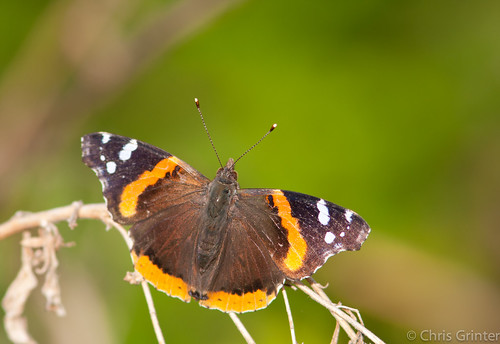తూర్పు సంయుక్త మరియు కెనడా యొక్క అత్యంత స్థానిక వార్తలు aflutter ఉంది (ఉంది) recently with reports of the irruption of రెడ్ అడ్మిరల్ – రెడ్ అడ్మిరల్ సీతాకోకచిలుక. ఈ ఒక సాధారణ సంఘటనగా ఈ సీతాకోకచిలుకలు దక్షిణ సంయుక్త లో వారి overwintering మైదానం నుండి ఉత్తర వెళ్లడంలో ప్రతి వసంత కాగా, the sheer numbers this year are staggering. There are quite literally thousands of admirals in our back yards.
So what’s different this year?
There is much speculation about the warm spring weather (warmest March on record for many places) and often lots of misinformation to go along with some armchair entomology. Most of the news sources I’ve come across say the warm spring has allowed these butterflies to flourish and reproduce in abnormal numbers. That isn’t quite possible however, V. atalanta overwinters as an adult. The southern states provide temps just warm enough for adult Vanessa butterflies to hide in the fall and be the very first to awaken in the spring to get a jump start on mating. Even if the butterflies were awake in February the host plants were not yet up (thistles); the butterflies in our backyards are from last year.
But what if weather did play a role in this boom cycle? Last year was a La Niña year with our beautiful and mild winter. The year before was an El Niño, most of the eastern US was assaulted with winter and we suffered at the hands of the epic Chicago “snowpocalypse”. Perhaps this combination depressed population numbers sufficiently in 2010/2011 which then decreased parasitoid load, allowing for greater overall butterfly fecundity in the summer of 2011. Those overwintering butterflies were then granted a warm winter that could have allowed for a lower winter mortality. As the butterflies moved north this spring there were no frosty nights to cut into populations – just lots of hungry birds. The result would be an abnormal influx of migrating butterflies.
But then again…
Despite butterflies being so popular and well studied there doesn’t seem to be a perfect grip on what conditions each of the Vanessa species prefer. The variables of host plants, population range, weather and parasitoids all play important roles in abundance and distribution. Did the weather cycles of the last few years variably effect one species over another? Who wants that PhD project (from hell)?
One of the best posts I’ve read is by Doug Taron over on సాలెగూడులోని సన్నని దారము చిత్ర యవనిక – he is skeptical of this warm weather theory. Critically this irruption is effecting only the population of the Red Admiral and any theory involving weather would also likely effect other migrant butterflies like the వెనెస్సా virginiensis – the American Lady. He also points out that an abundant butterfly like the admiral has classic cyclical population booms and busts in sync with parasite populations. I recall another summer in the late 90’s of staggering Admiral populations. Parasites really do better explain what we see in our yards this spring. While the weather might not have caused the abundance of V. atalanta, there can be no denying that butterflies of all species have woken up much earlier this year.



As far as I recall, almost all temperate zone animals (and plants, నేను సందేహిస్తునాను) go thru boom and bust cycles. It’s pretty much the function/nature of the wildly variable environmental conditions of the ecosystems. Even the less common temperate zone species cycle but the effects are less noticed simply because of the lower population levels.
must have been a lovely sight, vanessa atlanta has been struggling in the UK for the past few years!!
A few years back you may have heard about the painted lady invasion in the UK very much the same as the USA i was counting well over 1000 an hour coming up the field from the english channel !
Quick question about la nina i believe the later part of 2010 was also la nina thats why the UK and northern USA had such cold weather